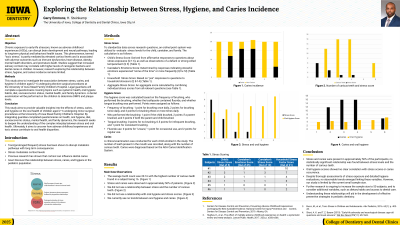Caries
383 - Exploring the relationship between stress, hygiene, and caries incidence


Garry Emmons
Student
University of Iowa, Iowa City, IA
University of Iowa
Hills, Iowa, United States- HS
Heidi Steinkamp, DDS PhD MS
University of Iowa College of Dentistry
Iowa City, Iowa, United States
Presenting Author(s)
Program Director(s)
Objective
Chronic exposure to early-life stressors, known as adverse childhood experiences (ACEs), can disrupt brain development and neural pathways, leading to long-term physical and behavioral health issues. This phenomenon, termed “toxic stress,” is partly mediated by elevated cortisol levels and is associated with adverse outcomes such as immune dysfunction, heart disease, obesity, mental health disorders, and premature death. Studies suggest that increased salivary cortisol may correlate with higher levels of cariogenic bacteria and dental caries in children. However, research exploring the relationship between stress, hygiene, and caries incidence remains limited.
Methods
This study aims to investigate the association between stress, caries, and hygiene in children aged 2–6 undergoing elective surgical procedures at the University of Iowa Stead Family Children’s Hospital. Legal guardians will complete a questionnaire covering topics such as systemic health, oral hygiene habits, diet, socioeconomic status, mental health, and family dynamics. A dental examination will be performed on the children to determine DMFS and plaque levels.
Results
The average tooth count among participants was 20.16.
The highest number of carious teeth found in a single subject was 16.
Stress and caries were both observed in approximately 50% of the participants.
No relationship was observed between stress scores and the number of carious teeth.
No correlation was found between oral hygiene scores and stress scores.
No clear trend was observed between oral hygiene scores and caries incidence.
These findings suggest a lack of statistically significant associations between stress, oral hygiene, and caries within the current sample size.
Conclusion
This study aims to provide valuable insights into the effects of stress, caries, and hygiene on the oral health of children aged 2–6 undergoing minor surgical procedures at the University of Iowa Stead Family Children’s Hospital. By integrating guardian-completed questionnaires on health, oral hygiene, diet, socioeconomic status, mental health, and family dynamics, this research seeks to deepen the understanding of the complex interplay between stress and oral health. Ultimately, it aims to uncover how adverse childhood experiences and toxic stress contribute to oral health disparities.
Identify Supporting Agency and Grant Number:

.jpg)